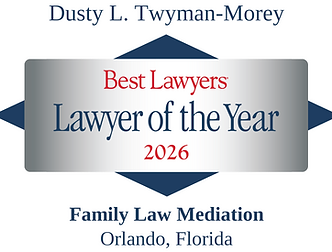



14422 Shoreside Way, Suite 110/826, Winter Garden, Florida 34787
(407) 905-0500


DUSTY TWYMAN-MOREY FAMILY LAW, P.A.



FLORIDA SUPREME COURT
CERTIFIED FAMILY LAW MEDIATOR
Most courts in Florida require parties to a family law matter to go to mediation before their case is set for trial, and in many cases, even before they can get a hearing. Though a party’s attendance at mediation may not be voluntary, the decision as to whether to enter into an agreement, and the terms of that agreement, are absolutely voluntary. Mediation is a process in which the parties and their attorneys (should they wish their attorneys to participate) have an opportunity to attempt a settlement, with parties making their own decisions, as opposed to a judge. Mediation is a confidential process in which a mediator can assist by serving as a neutral, impartial facilitator to encourage the resolution of the dispute. Mediators can often reduce obstacles to communication and assist the parties in identifying issues and options for settlement. The most common results of mediation are that the parties enter into:
(1) a temporary agreement;
(2) a partial agreement in which certain matters are resolved but others are reserved for either follow-up settlement negotiations or for court determination;
(3) a combination of the above;
(4) a full agreement on all matters; or
(5) an impasse.
Parties may also agree to return to mediation if they have found the session helpful but still have more work to do before an ultimate settlement can be reached. Mediation is a very useful process because the parties can often craft a much more specific agreement tailored to their needs than a judge would be able to do in the courtroom. I am a Florida Supreme Court certified family law mediator and am available to conduct mediations. In my role as an attorney, I represent clients in the mediation process, as well.

